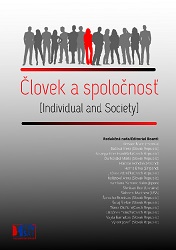Procrastination among more/less conscientious students. The role of self-control and academic motivation
Procrastination among more/less conscientious students. The role of self-control and academic motivation
Author(s): Marianna Berinšterová, Monika Magdová, Katarína Fuchsová, Jana KapováSubject(s): Higher Education , Educational Psychology, Social psychology and group interaction, Personality Psychology, Pedagogy
Published by: SAV - Slovenská akadémia vied - Spoločenskovedný ústav SAV
Keywords: Procrastination; Conscientiousness; Self-control; Academic motivation;
Summary/Abstract: Theoretical background: Procrastination is a phenomenon that causes negative consequences in terms of fulfillment of study obligations, study and work results. Educational psychology can examine its predictors and consequences in order to prevent this dysfunctional behavioral strategy - and such research has been found to be important especially among future teachers. Studies show that self-control as well as motivation could be the two pathways underlying the impact of conscientiousness on procrastination (Gao, Zhang, Xu, Zhou & Feng, 2021), or are considered important predictors of procrastination (Magdová, Fuchsová & Berinšterová, 2021). It has also been found that the variables of self-concept are involved differently in the level of procrastination of more/less conscientious university students (Berinšterová, Bozogáňová, Magdová, Kapová & Fuchsová, 2021). Research aim: Based on these results, the aim of the contribution was to verify the linear model of procrastination for two groups of university students – more conscientious and less consientious. Independent variables in the model were self-control, variables of academic motivation: external motivation, introjected motivation, identified motivation and internal motivation (knowledge, accomplishment, stimulation). Controlled variables were gender, perceived stress, and housing during semester. Methods: The sample consisted of 333 university students. 69.1% were women (n = 228) and 30.9% men (n = 105) aged 17 to 27 years (M = 20.51; SD = 1.61). The following research methods were used: the Ten-item personality inventory (Gosling, Rentfrow, Swann, 2003), Academic Motivation Scale for Students (Stover, De La Iglesia, Boubeta, & Liporace, 2012; Utvær, & Haugan, 2016); Self-Control Scale - shortened version (Finkenauer, Engels, & Baumeister, 2005); Lay Procrastination Scale for Student Populations (Gabrhelík, 2008; Gabrhelík, Vacek, Miovský, 2006) and PSS-4 (Cohen, Kamarck, Mermelstein, 1983) for measuring a global level of perceived stress. The sample was divided into more conscientious and less conscientious students by the visual binning method. Descriptive analysis, correlational analysis, T-test and linear regression was conducted in SPSS 20. Results: Among less conscientious students, higher level of procrastination (t=6.481; df=296.305; p<0.001; Cohen's d=0.735), amotivation for university study (t=4.274; df=182; p<0.001; Cohen's d=0.634), and stress (t=5.538; df=322; p<0.001; Cohen's d=0.615) was found. Among more conscientious students, the higher level of self-control (t=-8.455; df=311; p<0.001; Cohen's d=0.956), internal motivation (knowledge) (t=-2.003; df=183; p<0.050; Cohen's d=0.296), stimulation (t=-2.470; df=177; p<0.050; Cohen's d=0.373) and identified regulation (t=-2.300; df=178; p<0.050; Cohen's d=0.344) was found. Among more conscienious students significant negative correlation of procrastination and self-control (r=-0.468 p<0.001), accomplishment (r=-0.254; p<0.05), stimulation (r=-0.362; p<0.001) and positive association of procrastination and stress (r=0.246; p<0.05) was found. Among the less conscientious students, significant negative associations of procrastination and self-control (r=-0.328; p< 0.001), and positive association between procrastination and stress (r=0.170; p<0.05) were found. Both linear models were significant. Among more conscientious students, self-control (ß=-0.281; p<0.05), stimulation (ß= - 0.395; p<0.05) and introjected regulation (ß=0.281; p<0.05) significantly contributed to the model. Being a male was also associated to a higher level of procrastination. Among less conscientious students only self-control (ß=- 0, 468; p<0.001) signitificantly contributed to the model. Discussion: The results point to the importance of self-concept in relation to procrastination. Also, the connection between self-control and procrastination needs to be explored with regard to the motivational aspects of personality. Research has also pointed to a close relationship between self-control and conscientiousness. Promoting positive self-concept and academic motivation can be one of the strategies to prevent procrastination. Among the limits of the study, the lower reliability of the scale of conscientiousness, and gender imbalance in the sample can be mentioned.
Journal: Človek a spoločnosť
- Issue Year: 24/2021
- Issue No: 2
- Page Range: 19-34
- Page Count: 16
- Language: English

